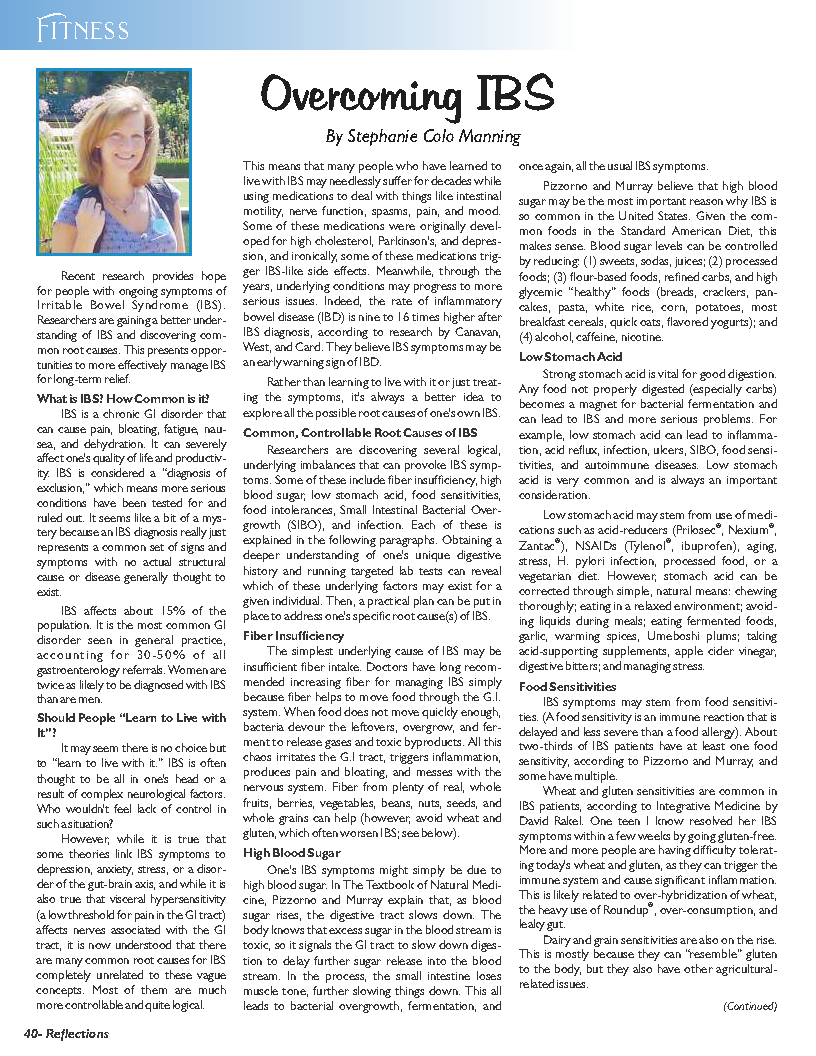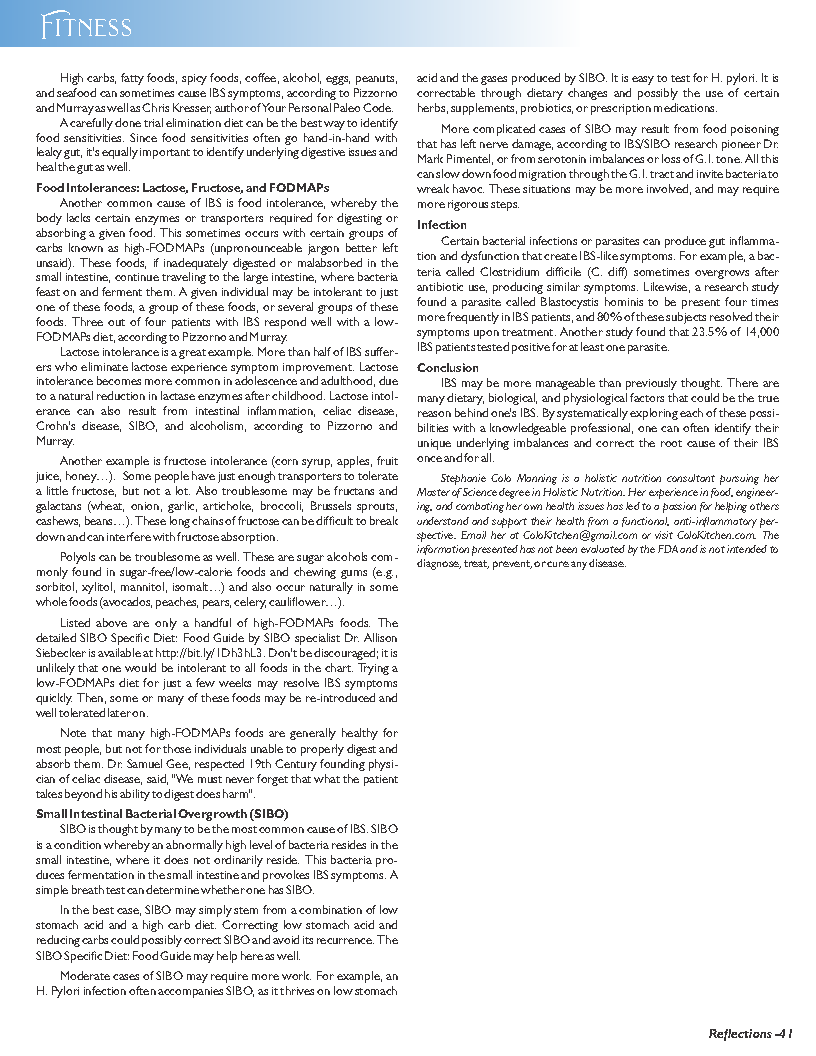By Stephanie Colo Manning
Recent research provides hope for people with ongoing symptoms of Irritable Bowel Syndrome (IBS). Researchers are gaining a better understanding of IBS and discovering common root causes. This presents opportunities to more effectively manage IBS for long-term relief.
What is IBS? How Common is it?
IBS is a chronic GI disorder that can cause pain, bloating, fatigue, nausea, and dehydration. It can severely affect one’s quality of life and productivity. IBS is considered a “diagnosis of exclusion,” which means more serious conditions have been tested for and ruled out. It seems like a bit of a mystery because an IBS diagnosis really just represents a common set of signs and symptoms with no actual structural cause or disease generally thought to exist.
IBS affects about 15% of the population. It is the most common GI disorder seen in general practice, accounting for 30-50% of all gastroenterology referrals. Women are twice as likely to be diagnosed with IBS than are men.
Should People “Learn to Live with It”?
It may seem there is no choice but to “learn to live with it.” IBS is often thought to be all in one’s head or a result of complex neurological factors. Who wouldn’t feel lack of control in such a situation?
However, while it is true that some theories link IBS symptoms to depression, anxiety, stress, or a disorder of the gut-brain axis, and while it is also true that visceral hypersensitivity (a low threshold for pain in the GI tract) affects nerves associated with the GI tract, it is now understood that there are many common root causes for IBS completely unrelated to these vague concepts. Most of them are much more controllable and quite logical.
This means that many people who have learned to live with IBS may needlessly suffer for decades while using medications to deal with things like intestinal motility, nerve function, spasms, pain, and mood. Some of these medications were originally developed for high cholesterol, Parkinson’s, and depression, and ironically, some of these medications trigger IBS-like side effects! Meanwhile, through the years, underlying conditions may progress to more serious issues. Indeed, the rate of inflammatory bowel disease (IBD) is 9 to 16 times higher after IBS diagnosis, according to research by Canavan, West, and Card. They believe IBS symptoms may be an early warning sign of IBD.
Rather than learning to live with it or just treating the symptoms, it’s always a better idea to explore all the possible root causes of one’s own IBS.
Common, Controllable Root Causes of IBS
Researchers are discovering several logical, underlying imbalances that can provoke IBS symptoms. Some of these include fiber insufficiency, high blood sugar, low stomach acid, food sensitivities, food intolerances, Small Intestinal Bacterial Overgrowth (SIBO), and infection. Each of these is explained in the following paragraphs. Obtaining a deeper understanding of one’s unique digestive history and running targeted lab tests can reveal which of these underlying factors may exist for a given individual. Then, a practical plan can be put in place to address one’s specific root cause(s) of IBS.
Fiber Insufficiency
The simplest underlying cause of IBS may be insufficient fiber intake. Doctors have long recommended increasing fiber for managing IBS simply because fiber helps to move food through the G.I. system. When food does not move quickly enough, bacteria devour the leftovers, overgrow, and ferment to release gases and toxic byproducts. All this chaos irritates the G.I tract, triggers inflammation, produces pain and bloating, and messes with the nervous system. Fiber from plenty of real, whole fruits, berries, vegetables, beans, nuts, seeds, and whole grains can help (however, avoid wheat and gluten, which often worsen IBS; see below).
High Blood Sugar
One’s IBS symptoms might simply be due to high blood sugar. In The Textbook of Natural Medicine, Pizzorno & Murray explain that, as blood sugar rises, the digestive tract slows down. The body knows that excess sugar in the blood stream is toxic, so it signals the GI tract to slow down digestion to delay further sugar release into the blood stream. In the process, the small intestine loses muscle tone, further slowing things down. This all leads to bacterial overgrowth, fermentation, and once again, all the usual IBS symptoms.
Pizzorno & Murray believe that high blood sugar may be the most important reason why IBS is so common in the United States. Given the common foods in the Standard American Diet, this makes sense. Blood sugar levels can be controlled by reducing: (1) sweets, sodas, juices; (2) processed foods; (3) flour-based foods, refined carbs, and high glycemic “healthy” foods (breads, crackers, pancakes, pasta, white rice, corn, potatoes, most breakfast cereals, quick oats, flavored yogurts); and (4) alcohol, caffeine, nicotine.
Low Stomach Acid
Strong stomach acid is vital for good digestion. Any food not properly digested (especially carbs) becomes a magnet for bacterial fermentation and can lead to IBS and more serious problems. For example, low stomach acid can lead to inflammation, acid reflux, infection, ulcers, SIBO, food sensitivities, and autoimmune diseases. Low stomach acid is very common and is always an important consideration.
Low stomach acid may stem from use of medications such as acid-reducers (Prilosec®, Nexium®, Zantac®), NSAIDs (Tylenol®, ibuprofen), aging, stress, H. pylori infection, processed food, or a vegetarian diet. However, stomach acid can be corrected through simple, natural means: chewing thoroughly; eating in a relaxed environment; avoiding liquids during meals; eating fermented foods, garlic, warming spices, Umeboshi plums; taking acid-supporting supplements, apple cider vinegar, digestive bitters; and managing stress.
Food Sensitivities
IBS symptoms may stem from food sensitivities. (A food sensitivity is an immune reaction that is delayed and less severe than a food allergy). About two-thirds of IBS patients have at least one food sensitivity, according to Pizzorno & Murray, and some have multiple.
Wheat and gluten sensitivities are common in IBS patients, according to Integrative Medicine by David Rakel. One teen I know resolved her IBS symptoms within a few weeks by going gluten-free. More and more people are having difficulty tolerating today’s wheat and gluten, as they can trigger the immune system and cause significant inflammation. This is likely related to over-hybridization of wheat, the heavy use of Roundup®, over-consumption, and leaky gut.
Dairy and grain sensitivities are also on the rise. This is mostly because they can “resemble” gluten to the body, but they also have other agricultural-related issues.
High carbs, fatty foods, spicy foods, coffee, alcohol, eggs, peanuts, and seafood can sometimes cause IBS symptoms, according to Pizzorno & Murray as well as Chris Kresser, author of Your Personal Paleo Code.
A carefully done trial elimination diet can be the best way to identify food sensitivities. Since food sensitivities often go hand-in-hand with leaky gut, it’s equally important to identify underlying digestive issues and heal the gut as well.
Food Intolerances: Lactose, Fructose, and FODMAPs
Another common cause of IBS is food intolerance, whereby the body lacks certain enzymes or transporters required for digesting or absorbing a given food. This sometimes occurs with certain groups of carbs known as high-FODMAPs (unpronounceable jargon better left unsaid!) These foods, if inadequately digested or malabsorbed in the small intestine, continue traveling to the large intestine, where bacteria feast on and ferment them. A given individual may be intolerant to just one of these foods, a group of these foods, or several groups of these foods. Three out of four patients with IBS respond well with a low-FODMAPs diet, according to Pizzorno & Murray.
Lactose intolerance is a great example. More than half of IBS sufferers who eliminate lactose experience symptom improvement. Lactose intolerance becomes more common in adolescence and adulthood, due to a natural reduction in lactase enzymes after childhood. Lactose intolerance can also result from intestinal inflammation, celiac disease, Crohn’s disease, SIBO, and alcoholism, according to Pizzorno & Murray.
Another example is fructose intolerance (corn syrup, apples, fruit juice, honey…) Some people have just enough transporters to tolerate a little fructose, but not a lot. Also troublesome may be fructans and galactans (wheat, onion, garlic, artichoke, broccoli, Brussels sprouts, cashews, beans…) These long chains of fructose can be difficult to break down and can interfere with fructose absorption.
Polyols can be troublesome as well. These are sugar alcohols commonly found in sugar-free/low-calorie foods and chewing gums (e.g., sorbitol, xylitol, mannitol, isomalt…) and also occur naturally in some whole foods (avocados, peaches, pears, celery, cauliflower…)
Listed above are only a handful of high-FODMAPs foods. The detailed SIBO Specific Diet: Food Guide by SIBO specialist Dr. Allison Siebecker is available at http://bit.ly/1Dh3hL3. Don’t be discouraged; it is unlikely that one would be intolerant to all foods in the chart. Trying a low-FODMAPs diet for just a few weeks may resolve IBS symptoms quickly. Then, some or many of these foods may be re-introduced and well tolerated later on.
Note that many high-FODMAPs foods are generally healthy for most people, but not for those individuals unable to properly digest and absorb them. Dr. Samuel Gee, respected 19th Century founding physician of celiac disease, said, “We must never forget that what the patient takes beyond his ability to digest does harm.”
Small Intestinal Bacterial Overgrowth (SIBO)
SIBO is thought by many to be the most common cause of IBS. SIBO is a condition whereby an abnormally high level of bacteria resides in the small intestine, where it does not ordinarily reside. This bacteria produces fermentation in the small intestine and provokes IBS symptoms. A simple breath test can determine whether one has SIBO.
In the best case, SIBO may simply stem from a combination of low stomach acid and a high carb diet. Correcting low stomach acid and reducing carbs could possibly correct SIBO and avoid its recurrence. The SIBO Specific Diet: Food Guide may help here as well.
Moderate cases of SIBO may require more work. For example, an H. Pylori infection often accompanies SIBO, as it thrives on low stomach acid and the gases produced by SIBO. It is easy to test for H. pylori. It is correctable through dietary changes and possibly the use of certain herbs, supplements, probiotics, or prescription medications.
More complicated cases of SIBO may result from food poisoning that has left nerve damage, according to IBS/SIBO research pioneer Dr. Mark Pimentel, or from serotonin imbalances or loss of G.I. tone. All this can slow down food migration through the G.I. tract and invite bacteria to wreak havoc. These situations may be more involved, and may require more rigorous steps.
Infection
Certain bacterial infections or parasites can produce gut inflammation and dysfunction that create IBS-like symptoms. For example, a bacteria called Clostridium difficile (C. diff) sometimes overgrows after antibiotic use, producing similar symptoms. Likewise, a research study found a parasite called Blastocystis hominis to be present four times more frequently in IBS patients, and 80% of these subjects resolved their symptoms upon treatment. Another study found that 23.5% of 14,000 IBS patients tested positive for at least one parasite.
Conclusion
IBS may be more manageable than previously thought. There are many dietary, biological, and physiological factors that could be the true reason behind one’s IBS. By systematically exploring each of these possibilities with a knowledgeable professional, one can often identify their unique underlying imbalances and correct the root cause of their IBS once and for all.
Stephanie Colo Manning holds a Master of Science degree in Holistic Nutrition. The information presented has not been evaluated by the FDA and is not intended to diagnose, treat, prevent, or cure any disease. References available upon request.


